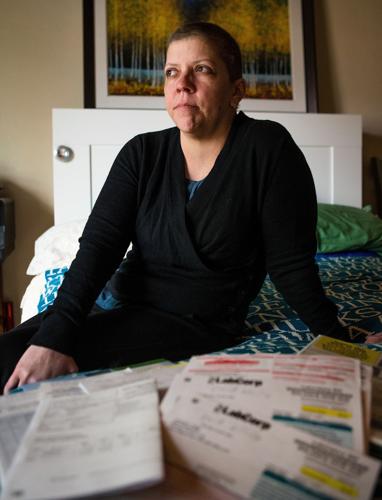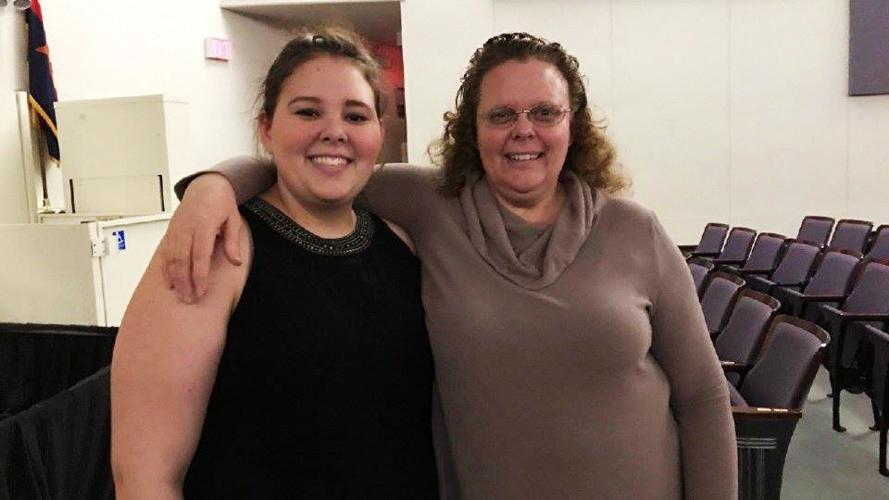Until she got health insurance through the , УлшжжБВЅ real estate broker Jennie James routinely spent $12,000 per year in health bills related to the chronic illness sheтs had since childhood.
The coverage sheтs been able to get through the since 2014 has saved her thousands of dollars, and for the first time in her adult life, given her some peace of mind about her health care.
James, 37, is one of many Southern УлшжжБВЅns who say theyтre terrified about what might happen if the Affordable Care Act (ACA) is repealed. The 2010 law has received well-publicized criticism for premium increases, a lack of plan choices and for its тindividual mandateт provision that all Americans have health insurance. But it has also had positive effects.
People are also reading…
Like a lot of Americans, James does not think the Affordable Care Act is perfect. Sheтd prefer a Medicare-for-all system that gives all Americans equal access to coverage. But she knows that the act, also known as Obamacare, is better than any alternative sheтs experienced.
тThe ACA was not perfect, but it saved my life and made sure I didnтt go bankrupt due to health issues,т said James, who is president-elect of the УлшжжБВЅ Womenтs Council of Realtors and a director with the . тI donтt know what I will do once it is repealed. The options are scary and expensive.т
James has had since she was 13. Last year, she was unexpectedly hit with another big health expense when she was diagnosed with triple negative breast cancer. Even with two illnesses to manage, her out-of-pocket expenses were still lower than they were before the ACA. Also, because of protections in the law, she stopped worrying about being dropped or denied coverage because of a pre-existing condition.
тI was more depressed after the (presidential) election than I was after my breast cancer surgery,т she said. тI will need another surgery in a few months, but I donтt know whether I will still have insurance.т
And itтs not for a lack of trying. James has been regularly calling and emailing her congressional representatives т Republicans and т since the election. She says sheтs not getting answers from either.
тI have asked what his plan is since he doesnтt like the Affordable Care Act, and asked how is he going to help me?т James said of McCain.
тEach time I get a canned response from him that just says that he doesnтt like the Affordable Care Act and is working to repeal it. None of my questions are ever answered, and that response, which I have gotten several times, is basically a slap in the face and shows that he does not care about me at all.т
McCain emailed a written response to the Starтs questions about what УлшжжБВЅans like James should expect. He did not describe a replacement plan. He said he is committed to ensuring УлшжжБВЅ families have access to тquality, affordable and accessible health careт т something theyтve been denied under the ACA, he wrote.
He pointed out that in УлшжжБВЅ, nearly every county has just one option on the health-insurance marketplace, and that premiums have gone up. The marketplace is the exchange where УлшжжБВЅns can purchase private health insurance and qualify for federal subsidies to help pay for it.
тThis law, which was jammed through Congress by Democrats on a strict, party-line vote, continues to crumble across our state,т McCain wrote. тUnless we implement an alternative, the unraveling of Obamacare will only get worse. Thatтs why Iтm committed to working with my colleagues and the incoming administration to replace Obamacare with a solution that delivers every American access to the flexible, quality and affordable health care they need.т
McSally responds
McSallyтs office also emailed a statement, saying Southern УлшжжБВЅns deserve access to affordable, quality care but that Obamacare was тflawed from the beginning and is collapsing under its own weight.т She, too, cited rising premium costs for УлшжжБВЅns on the federal marketplace.
тLike many Iтve spoken to in Southern УлшжжБВЅ, I have concerns about providing for the transition to a better health care system, and throughout last week, I engaged with House leadership and my colleagues to voice and address those concerns,т McSally wrote.
тAs we move forward, my focus will be on providing continuity and certainty for my constituents to ensure they have access to the health care they need during this transition.т
The Affordable Care Act was not just about premium costs on the marketplace, though thatтs what the lawтs critics often focus on.
Among other things, it prevented insurance companies from denying people coverage because of pre-existing conditions; it implemented safety measures that included penalizing hospitals with high rates of patient injuries and infections; and it allowed young adults to stay on their parentsт health insurance until age 26.
Federal health officials say the law has actually slowed the growth of health-care costs.
The nonpartisan Congressional Budget Office Tuesday that said eliminating the lawтs individual insurance mandate and marketplace subsidies in two steps would leave 18 million Americans without insurance after one year. That number would jump to 32 million by 2026, the report says.
The report also says under that scenario, premium rates would go up by 20 to 25 percent more than the projections of premium rate increases under current law.
McSally spokesman Patrick Ptak emphasized in an email that her vote Jan. 13 did not repeal Obamacare. Rather, it included instructions to тguide the legislative process to repeal and replace the failing Affordable Care Act.т
тRep. McSally will thoughtfully consider each step of this process as it comes before the House with a focus on ensuring continuity and certainty for her constituents,т Ptak wrote.
тIтd be deadт
УлшжжБВЅ resident Mark Morrow says that if it wasnтt for the ACA, heтd be dead.
Heтd been in private practice as a lawyer when he was diagnosed with prostate cancer eight years ago, and continued working until he got too sick.
Heтs now 63 and his cancer is advanced. Before the ACA, Morrow had insurance with a $1 million lifetime cap, which means once the insurance company had paid $1 million for his care, it would stop paying. The ACA ended the caps, which was fortunate for Morrow. He says his care has cost more than $2 million.
Heтs on a silver-level health plan from Ambetter by Health Net that costs $137 per month т he gets a federal subsidy т and has a deductible of $600 and an out-of-pocket spending maximum of $2,200.
Pima County residents had almost no choice of plans on this yearтs federal marketplace. Banner Health is not considered in-network for the Ambetter plans, but Morrow successfully filed a тcontinuation of careт request since all his cancer care has been with Banner. Ambetter is covering his care there.
тThe upcoming repeal of the Affordable Care Act and its so-called replacement is going to determine whether I, brothers, sisters, parents and children live or die as a direct result of this vote, not cancer,т Morrow wrote in a recent letter to members of УлшжжБВЅтs congressional delegation.
тI have always paid for health insurance for 40 years. I have paid for employees. I never had any serious illness nor used much in coverage until my diagnosis. Now I need it.т
Like others, Morrow says Obamacare has flaws. But he wonders why Congress canтt just correct those imperfections.
тItтs unforgivable where we are at,т he said. тWe should be on a single-payer system. ... Of course they are not perfect, but they work pretty well. Here in the U.S. we just canтt get over the hurdle of the drug folks and the insurance companies. Itтs ludicrous.т
Morrow says he wants to get older, to live into his 70s. When he was diagnosed eight years ago, the chemo drug heтs on now didnтt even exist. Medical advances like that give him hope.
тIтve said to my doctor, тI want to be that guy who is the first to overcome this.т Weтre going to have a cure,т he said.
тThen all of a sudden I find out my right to continue on my journey, to have time with my grandchildren, might go away? Why is our own government doing this to us?т
тJust the beginningт
During last Sundayтs rain, about 50 УлшжжБВЅans stood in front of Banner-University Medical Center УлшжжБВЅ in a mock wake to mourn efforts to repeal the ACA and to denounce for-profit health care.
тThis is just the beginning,т said Lee Stanfield, a retired social worker who participated.
Stanfield noted the ACA lowered her Medicare costs by giving a discount on prescription drugs to beneficiaries who fall into the so-called Medicare Part D тdoughnut hole,т which is a coverage gap for prescription-drug expenses. The ACA has been on track to completely phase out the doughnut hole by 2020.
тI consider everyone to be benefiting from the Affordable Care Act,т said Carol Fiore, a УлшжжБВЅ writer in her 50s who demonstrated alongside Stanfield. тWhen my husband died, my kids and I lost our insurance and getting insurance after that was always a fight.т
Fiore said that for years she couldnтt get adequate coverage because sheтd had skin cancer. Her coverage also didnтt pay for preventive care. Now sheтs on a Cigna plan for $600 per month and the company isnтt allowed to deny her coverage because of her past skin cancer. Plus, her preventive checkups are free.
Set the bar higher
, a УлшжжБВЅ Democrat, spent Wednesday morning with health providers at , listening to their concerns about a possible ACA repeal. They talked about the joy of seeing families get insured, about the lawтs positive integration of behavioral and primary care and of the ways it improved access to providers.
Grijalva said itтs important to agitate members of Congress who might not understand the positive aspects of the ACA, and to tell human stories.
He also heard about the lawтs shortfalls, among them the still-high uninsured rate among УлшжжБВЅ Latinos and the limited choices for УлшжжБВЅns who purchase their insurance on the marketplace.
тWe can vigorously defend what we have, but I think we can set the bar a little higher and talk about what it should be,т Grijalva said of the law.
While many demonstrations around the country have called for a Medicare-for-all single-payer system as an alternative to the ACA, that route has many critics who say it wouldnтt work in a large country like the United States.
тI think we can do better than the Canadian system,т health-policy expert and University of УлшжжБВЅ professor Dr. Daniel Derksen said. тPeople like choices, and competition makes the system work better т one plan (single payer) will not meet everyoneтs needs.т
Derksen said it would help to have the marketplaces put out bids for insurers, who would hold contracts for three to five years т similar to what the U.S. Department of Defense does with its insurance program, and what the УлшжжБВЅ Health Care Cost Containment System (AHCCCS) does for the stateтs Medicaid program.
Multi-year, multi-state approaches could help reduce the risk for insurers while providing more options for consumers, he said.
тPeople donтt understandт
right before the ACAтs marketplace for insurance opened up, they had no concept of what the law meant.
тI didnтt understand it. No one did,т Danielle Chandler said last week. тI learned a lot, but when I talk to people now, my biggest thing is that even now, people donтt understand what the ACA does.т
In 2013 the family was uninsured and had thousands of dollars in medical bills because of daughter Kaylaтs unexpected illness т a diagnosis of ulcerative colitis. Before that, the family had been gambling on not getting sick.
At the time, Danielle was working on contract and her husband was unemployed. Theyтd applied for Medicaid, a government insurance program for low-income people, but Danielleтs $33,000 annual salary at the time was too high to qualify.
Things have since changed for the better. Danielle, 47, is now a full-time employee with the U.S. Postal Service with excellent employer-sponsored health coverage for the family. Husband William, also 47, is a Sun Tran bus driver, and daughter Kayla, 16, is a junior at University High School .
Though sheтs got employer-sponsored insurance, Danielle worries constantly about an ACA repeal. Two of the lawтs major provisions are key to Kayla's future т the prohibition against denying coverage to someone with a pre-existing condition and keeping kids on their parents insurance until age 26.
тSheтs got to have a colonoscopy every five years for the rest of her life,т Danielle said. тWe are still paying off the medical bills from when we were uninsured.т
Danielle said that had she not been able to get insurance through her employer, the family was set to get insurance through the marketplace.
тI am very nervous for Kaylaтs future,т Danielle said.
тI need to knowт
Real estate broker James and her mother, former УлшжжБВЅ legislator Sue Wachter, estimate that since 1993 theyтve spent about $90,000 out of pocket managing Jamesт Type 1 diabetes т and James has always had insurance. But sheтs often had insurance that was far from ideal, and her pre-existing condition made better coverage prohibitively expensive.
Before the ACA, she was quoted $800 per month for health coverage. The marketplace plan she has now is an Ambetter gold-level plan that costs $450 per month and has a deductible of $1,400. Since sheтs had to cut back on her work hours because of illness, James qualified for a federal subsidy that knocks her monthly premiums down to $310.
James and Wachter continue to call and email УлшжжБВЅтs congressional delegation. Every time she calls, Wachter asks for a copy of an Obamacare replacement plan. She said she has never received anything back. James hasnтt had any satisfactory answers, either.
тWill my coverage end immediately? I need to know.т
Contact health reporter Stephanie Innes at 573-4134 or email sinnes@tucson.com. On Twitter:
@stephanieinnes























